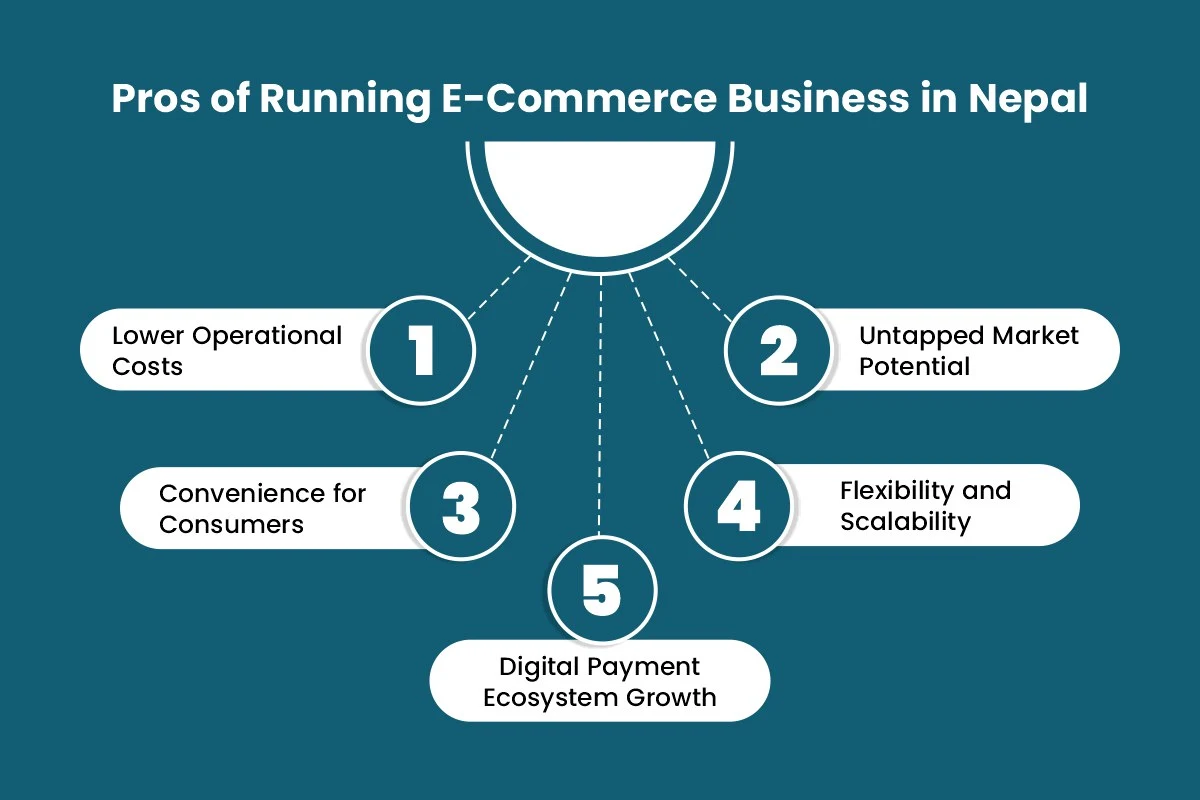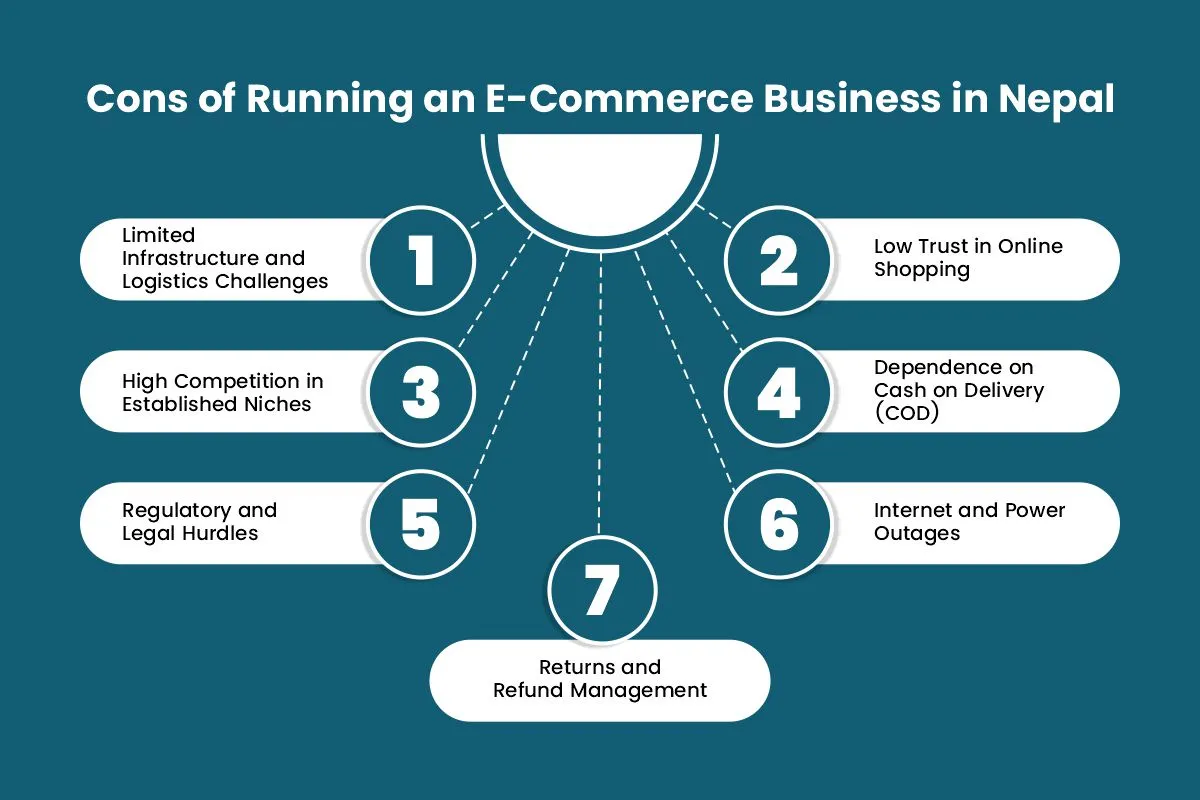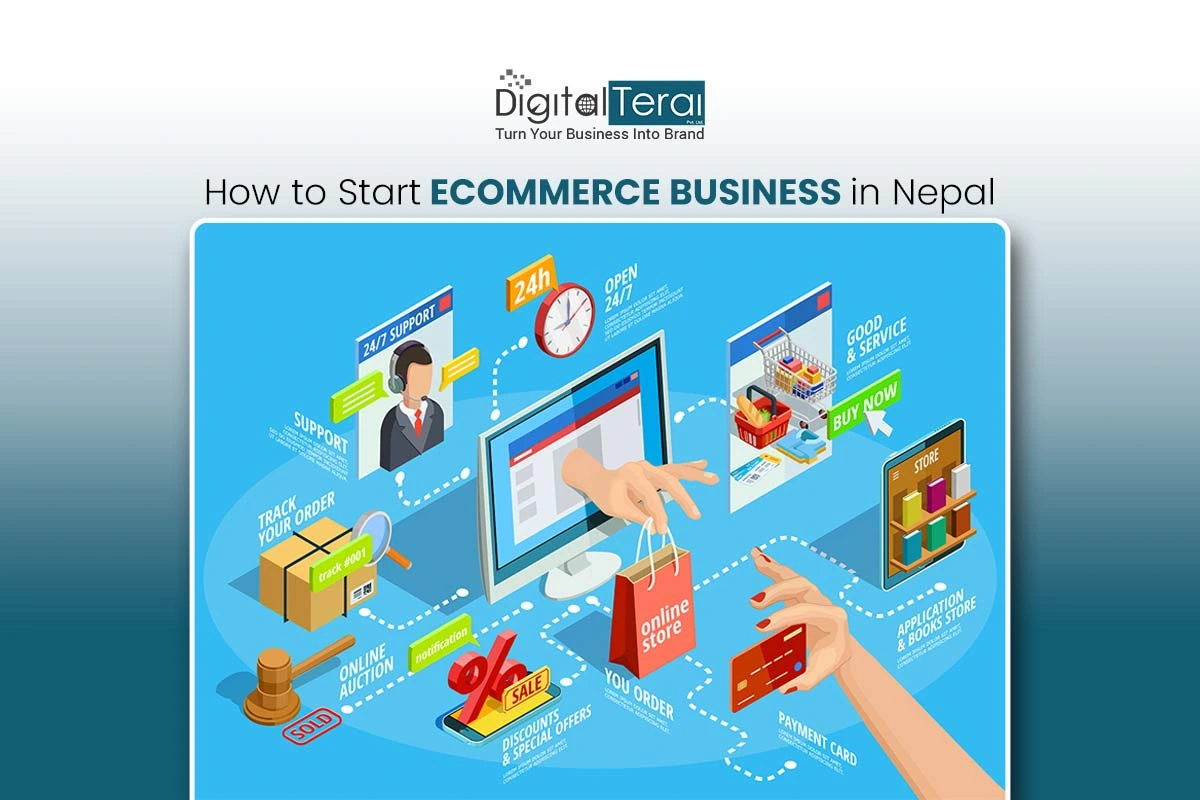The growth of e-commerce in Nepal offers businesses exciting opportunities to participate in a flourishing online industry. The environment is favorable for creative enterprises to thrive as internet availability increases, smartphones become more reasonably priced, and customers embrace online purchasing for convenience.
Digital wallets like eSewa and Khalti facilitate smooth transactions, while platforms like Daraz, SastoDeal, and HamroBazaar are already changing consumer behavior. Social media's growing influence on shopping decisions gives this tendency a dynamic edge.
In this blog, we will help you learn how you can maximize this growth and start Nepal in a successful e-commerce business
Understanding the E-commerce Landscape in Nepal
Internet Penetration and Digital Adoption
As of 2025, the internet penetration in Nepal has crossed 90% and it has led to a good foundation for digital adoption. Expansion of telecom infrastructure and affordable smartphones’s reach in rural areas have made it possible for businesses to target the unreachable demographics. This has given businesses to draw customers and grow their business significantly.
Popular E-commerce Niches in Nepal
Finding the right niche can change the success of your e-commerce business considerably. The most popular and lucrative sectors include:
- Fashion and Apparel: Clothing and accessories are high-demand categories and have seen consistent market interest, which explains their top performance.
- Electronics and Gadgets: Tech-savvy buyers are attracted to this category from smartphones to home appliances.
- Health and Wellness Products: Consumers are prioritising and seeking organic and herbal products for better health.
- Grocery and Essentials: Thanks to the surge in ordering everyday items online, this segment has boomed significantly in recent days.
- Handicrafts and Local Art: Because of its rich cultural heritage, Nepal’s handicrafts and local arts are profitable niches for both domestic and international markets.
Key Competitors and Market Analysis
Planning every aspect needed to launch and grow your e-commerce business effectively is key to success. Some of this includes taking the right message centered on how your business caters to your target market, picking the best business model for your business, doing a SWOT analysis, and even following the legal process.
How to Start Your E-commerce Business?
Planning every aspect needed to launch and grow your e-commerce business effectively is key to success. Some of this includes taking the right message centered on how your business caters to your target market, picking the best business model for your business, doing a SWOT analysis, and even following the legal process.
1. Identifying Your Target Market
Your audience needs to be your focus. Do proper market research, to learn about the demographics, preferences and purchasing behaviors. To refine your target market you can explore completing surveys, focus groups, and competitor analysis. If you offer your product to people with specific needs, you will have a strong client base.
2. Choosing the Right Business Model
Your business model defines your operational framework. Some of the most popular business models are given below:
- B2C (Business to Consumer): Selling directly to consumers. It is the most common model of e-commerce in Nepal.
- B2B (Business to Business): Designed for wholesale/supply chain use cases targeting other businesses.
- C2C (Consumer to Consumer): This model is benefitting platforms like HamroBazar that bridge the gap between individual buyers and sellers.
3. Conducting a SWOT Analysis
A detailed SWOT (Strengths, Weaknesses, Opportunities, Threats) analysis can be quite detailed and is a roadmap for your business. For example:
- Strengths: Unique product offering or lower cost items.
- Weaknesses: Lack of experience or logistical problems.
- Opportunities: Local partnerships or suppliers that can be tapped.
- Threats: It's an established competitor or regulatory hurdle.
Legal Requirements and Registrations in Nepal
Navigating the legal framework is essential to avoid future complications.
Here’s a breakdown of the requirements:
- Registering Your Business: Obtain a business registration certificate from the Department of Industry.
- PAN/VAT Registration: Ensure compliance with tax regulations given by the IRD (Inland Revenue Department) to avoid legal issues.
- Import/Export Regulations (if applicable): Follow specific guidelines given by the Department of Customs if your business involves international trade.
- Complying with Consumer Protection Laws: Abide by these laws mentioned in the Consumer Protection Act 2054 and the National Penal Code to maintain transparency and customer trust.
How to Choose an E-commerce Platform?
Selecting the right e-commerce platform requires balancing your business's specific needs with the platform's features and scalability. Comparing local and international platforms or custom-built versus ready-to-use solutions ensures you align your choice with your operational goals.
- Local vs. International E-commerce Platforms: Local platforms should cater specific needs of Nepali people. This will make them ideal for small-scale operations. International platforms like Shopify offer advanced tools for scaling and global outreach. Evaluate your business goals to choose the right fit.
- Custom-Built Websites vs. Ready-to-Use Solutions: Custom-built websites provide greater flexibility for unique business needs, but they require more time and resources. Ready-to-use solutions like WooCommerce and Shopify are cost-effective and quick to launch.
- Mobile App Integration: Given the dominance of mobile users in Nepal, integrating a mobile app ensures accessibility and enhances user experience, driving customer retention and sales.
Building an E-Commerce Website
Creating an e-commerce website involves careful planning, design, and implementation to ensure functionality and a positive user experience. Incorporating essential features and best design practices will make the platform reliable and visually appealing to customers.
Some design tips and essential features of E-Commerce websites are given below:
Website Design Tips
Focus on simplicity and user-friendliness:
- Always go for clean layouts and intuitive navigation.
- You should prioritize fast-loading speeds over high-res content.
- Make sure that the website is also designed for mobile platforms and is responsive to capture mobile-first users.
Essential Features:
- Product Listings and Categories: A successful e-commerce website should provide detailed and accurate product listings that are organized into clear categories to help customers easily navigate and find the items they are looking for.
- Secure Payment Gateway Integration: Implementing a secure payment gateway is essential to protect customer financial information and ensure seamless and trustworthy online transactions, thereby fostering user confidence.
- User-friendly Navigation and Search: The website must include intuitive search functionality and advanced filtering options, enabling customers to quickly locate desired products based on their preferences, such as price, size, brand, or other attributes.
Setting up Payment Gateways in Nepal
Integrating trusted payment options like eSewa, Khalti, IME Pay, and Cash on Delivery ensures accessibility and flexibility for a diverse customer base. Providing multiple payment methods can help you cater to varying user preferences and increase sales.
Some options for payment gateways are given below:
- eSewa: Widely accepted across Nepal, eSewa provides a seamless and secure payment platform. It enables users to pay bills, recharge mobile services, and make online purchases, fostering trust through its reliability and accessibility.
- Khalti: Known for its speed and reliability, Khalti is an excellent choice for quick and convenient transactions. It offers an intuitive interface and a wide range of services that cater to urban and tech-savvy users.
- IME Pay: Designed to bridge the digital divide, IME Pay extends its reach to rural users by providing a user-friendly mobile payment solution. Making it easier for underserved communities to engage in cashless transactions.
- Cash on Delivery (COD): Offering Cash on Delivery as a payment option builds customer trust. Particularly among first-time buyers, by allowing them to verify the product's quality before making the payment.
Marketing Your E-commerce Business in Nepal
A multi-channel marketing approach can maximize your reach and engagement, driving your business toward faster growth. Strategies like social media marketing, SEO, and paid ads work together to attract and convert potential customers effectively.
1. Digital Marketing Strategies

Develop a multi-channel marketing approach that helps your e-commerce business grow faster by implementing a solid digital marketing strategy for eCommerce.
Some strategies are as follows:
Social Media Marketing (Facebook, Instagram, TikTok)
You can engage younger audiences by creating engaging, relatable, and visually appealing content tailored for TikTok, Facebook, and Instagram, leveraging trending topics and interactive posts to drive brand interaction.
Search Engine Optimization (SEO) for Visibility
You can boost your organic traffic by optimizing your website for search engines through eCommerce SEO strategies such as high-quality, keyword-rich content, faster load times, and mobile-friendly design to improve visibility and ranking.
Paid Ads (Google Ads, Facebook Ads)
You can use targeted campaigns on Google and social media platforms by utilizing demographic insights, behavioral data, and remarketing strategies to deliver personalized ads that convert.
2. Building Customer Base
Offer loyalty programs, discounts, and special promotions. Collaborate with influencers to amplify brand awareness and credibility.
Some tips are as follows:
Loyalty Programs and Discounts
Offer loyalty programs, discounts, and special promotions to encourage repeat purchases, increase customer retention, and create a stronger connection between your brand and its audience.
3. Leveraging Influencer Partnerships
Collaborate with influencers to amplify brand awareness and credibility through influencer marketing by tapping into their established audiences and creating authentic endorsements that resonate with potential customers.
What are the Pros and Cons of running an E-Commerce Business in Nepal?
Being in the e-commerce business in Nepal has its pros and cons. Lower operational cost and untapped potential are the advantages of this market, but also limited infrastructure and low consumer trust are the drawbacks. It is key to understand the pros and cons of this growing sector for success.
Some of the major pros and cons of running an E-Commerce Business in Nepal are as follows:
Pros of Running E-Commerce Business in Nepal

There are numerous advantages of the Nepalese market for the business, so it can easily provide an idea for entrepreneurs in an e-commerce business.
Some of them are given below:
- Lower Operational Costs: Since running an e-commerce business in Nepal reduces overheads, such as fewer physical stores and fewer manpower needs; operational costs remain quite low.
- Untapped Market Potential: Nepal is still a largely undiscovered e-commerce market that has many potential places for businesses to market to new and underserved consumer segments.
- Convenience for Consumers: The convenience of shopping from home has benefited consumers because of the time and effort saving ordered products online instead of going to physical stores.
- Flexibility and Scalability: Expansion of product offerings and scalability of the business at demand growth has minimal investment required in infrastructure, it’s very simply e-commerce.
- Digital Payment Ecosystem Growth: As Nepal’s digital payment ecosystem is growing, online e-commerce businesses can now provide secure and resourceful online payment choices to increase the customers’ confidence and earning
Cons of Running an E-Commerce Business in Nepal

Although there are many clear benefits when running an e-commerce business in Nepal along with the benefits, there are also challenges that businesses may face.
Some of them are as follows:
- Limited Infrastructure and Logistics Challenges: Because the country’s infrastructure and logistics capabilities are developing, shipments of products to remote or rural areas lead to delays.
- Low Trust in Online Shopping: Despite the comfort of online shopping, many consumers in Nepal are hesitant to take the plunge because of doubts over product quality, payment guarantees and the inability of potential clients to examine goods before buying them.
- High Competition in Established Niches: These are highly popular product categories, and it is very hard for any new business to differentiate itself to capture market share.
- Dependence on Cash on Delivery (COD): Much of the market still expects to pay cash on delivery, which increases logistical costs and increases the risk of returns or cancellations.
- Regulatory and Legal Hurdles: Like any other country in the world, there is an evolving e-commerce regulatory landscape in Nepal, which presents issues regarding where e-commerce business firms stand in terms of tax laws, consumer rights, and product standards.
- Internet and Power Outages: A common occurrence of internet and power interruptions can inhibit business operations and disturb the flow of business services and the timely order
- Returns and Refund Management: Returns and refunds present a headache to manage because there may be a number of dissatisfied customers interested in a refund or exchange of the product they purchased.
Conclusion
Starting an e-commerce business in Nepal is an exciting opportunity that thrives on smart planning and innovation. Choosing the right platform, whether local or international, and building a user-friendly website with secure payment options like eSewa, Khalti, IME Pay, or COD, ensures trust and convenience.
Pair this with essential features, mobile app integration, and a multi-channel marketing strategy using social media, SEO, and paid ads to accelerate growth.
FAQs
How to register an online business in Nepal?
You can register your online business by submitting the required documents to the Office of the Company Registrar and obtaining a PAN/VAT certificate.
Do I need to register my online business in Nepal?
Yes, registering your business is required for legal operation and tax compliance.
Is E-commerce legal in Nepal?
Yes, e-commerce is legal in Nepal and follows the guidelines set by the government.
Which eCommerce platform is best in Nepal?
Popular e-commerce platforms in Nepal include Daraz, SastoDeal, and HamroBazzar, based on business needs.



